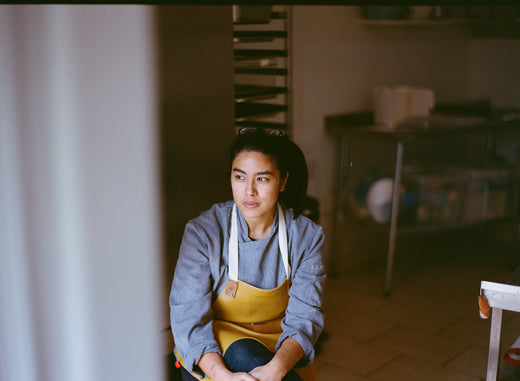News from the Grindstone Series – 04 Made By Adele

Today we’re in the kitchen with Adele Hing, talking about how she transformed a period of depression, anxiety, and redundancy into an award-winning cake business now in its fifth year. Her strength of belief in what she should make, her unique flavour combinations, and determination to do something different have won the support of her local community, all of who have helped to support her business through word of mouth.

Adele started her cake business in 2020, in lockdown. As I arrive at her house in Hampton, her rescue dog Pluton sounds the alarm – “he’s our doorbell” Adele explains. Over the last four years, her business has grown and won multiple Great Taste Awards, as well as a Golden Fork nomination, with a focus on using the highest quality sustainable ingredients. I was interested to hear about Adele’s path to building a successful business, especially one born during the challenges of covid and ensuing economic climate. Prior to starting Made By Adele, she worked for years at Waitrose, Nando’s, and Le Pain Quotidien, each of which contributed something to her skills-set and her organised, balanced approach to managing her business today.

Her determination to work for herself, and not a corporation, has been a driving force. Working in restaurants from the age of 15, she would go on to complete a geography BA, with a particular interest in “the geographies of food, farming and health – always a connection to food”. A stint at Waitrose Head Office ensued, in their in-house catering operations. At that point in time around 2015, supermarket sales were slumping, and part of her role was to innovate to tempt people to shop there, including creating wine bars, juice bars and new cafes in various branches. Adele eventually moved on to Nando’s head office to work on operational development, which included new menu concepts, kitchen design, and equipment testing. However, while she felt they were an “amazing company to work for”, after a visit to a chicken supplier they worked with she was not comfortable with the realities of high-volume meat production and decided to move on.
At Le Pain Quotidien, whose food ethics for fresh and organic ingredients matched her own, “I felt like I’d landed my dream job. I started in January 2020, then Covid hit, everything blew up. It was a bad time.” She explains the company went into administration in the summer of 2020. During a period where parts of the company were sold off including certain shops, Adele was rehired by the new management, but experienced for the first time in her life a period of depression and anxiety, and had to take time off for her mental health. “I was made redundant soon after”, she recounts. “It was an extremely difficult time.”

It was during the pandemic and post-redundancy that she decided to become self-employed, to do something for herself. “My dad is self-employed. It felt like the right time to try and do it. Lots of businesses popped up, not all of them lasted.” Originally she planned to bake bread from her kitchen workshop, but decided against it operationally. She set up a cake business overnight from her kitchen with an Instagram account, and hoped that local people would spread the word. Social media “was brilliant” for this specific purpose. “People were really supportive in the pandemic, supporting neighbours, people were reliant on collecting local food and not going out. It started small – in my kitchen I already had the equipment (cake tins), and I bought packaging. Within a few months I had four or five birthday cakes in a day. I didn’t even have a website for the first nine months, I was just running it off social media and local people. I realised it was going somewhere, but I didn’t have a long-term plan.”
Adele knew she did not want to return to the types of jobs she had worked in the past, and also knew with certainty she had no interest (despite some consumer appetite for it) in making “novelty” cakes, with food colourings, high sugar, additives, flavourings or e-numbers, all of which formed part of a different cake market to where she envisaged herself. She turned down work that didn’t fit with her ethos. “It’s taken a few years for people to understand what I do. People didn’t understand when I wouldn’t do a football themed cake”, for example. Instead, she very carefully tested a menu of her cakes, trying to “change the understanding of what the cake industry can be”, and developed unique flavours under her own name. It took some time for her to say what she “will and won’t do”, but this became a fundamental part of her business evolution. Working alone, initially she felt “very vulnerable, and in a mentally poor position at that time. In an ideal world, I would have built it as a side hustle. It’s difficult to leave the security of a job”. However the combination of redundancy and the global pandemic meant she channelled all her energy into it immediately, and it quickly snowballed.

Adele reflects that cake can sometimes “get a bad rap – a view that it looks amazing but tastes horrible is something that grates on me”, in relation to cakes which have put appearance above flavour. She is working to change that view. “It should taste great first, and look beautiful second”. Approximately 70% of her current business is now weddings. She therefore creates cakes which both form a beautiful centrepiece but ultimately which have incredible flavours that people will remember. This association between taste and memory is an interesting one. She now finds that couples who purchased a wedding cake from her later return to buy the postal wedding cake taster boxes (designed for those who are planning their weddings), so that they can relive the flavours and wedding memories. It’s a rather lovely side of the business that her cakes play such a key part in people’s weddings and relationships afterwards through taste.

In 2023 and 2024 she entered the Great Taste Awards with the Guild of Fine Food, and each time won stars for multiple entries. One of her highest scoring three-star winners was her banana sponge, miso caramel and roasted peanut icing cake, inspired by the flavour profile of Snickers, with caramel and nuts and sweetness balanced with a touch of savoury. Other winners included her yuzu, coconut and white chocolate cake, her earl grey, bergamot and vanilla, and passion fruit, white chocolate and vanilla bean cake. Adele made 300 samples of the banana cake (single handed) for the Golden Fork awards, after which “all sorts of people” who tried it got in touch with her to say how much it matched its description. The judging is done blind. Making cakes that actually taste, identifiably, of the flavours they are supposed to was “validation of everything I’ve been trying to do for four years. I’ve worked hard for it and built a business I really believe in.” She purposefully creates memorable flavours which you can’t buy in a shop. At peak wedding season in the summer she might do three or four wedding cakes in a weekend.

When asked what advice she would offer anyone looking at taking the same leap or to herself starting out at the beginning, Adele says “don’t try and do what other people are doing. Stick to your guns. Whether price, style – remember if you are a small business of just one person, say no to things you don’t believe in.” This has done a lot of good for her brand, creating something unique, and which is clear to customers. “Do what you believe in. Believe in what you are selling and marketing.” She remembers this can be hard when there are lulls, but “be strict. Try not to do everything”. This purity of vision has stood her in good stead for the creation of her brand. Other advice she would give herself five years ago is to know when you need help, especially in a business of just one person. In her case, this has involved getting a personal assistant to help part-time with admin, so that she can be in the kitchen. “Knowing when you have outgrown yourself, when you have to let go and delegate” – even if this can be hard for a self-described “control-freak”.
Her experience of working with larger scale businesses means she is experienced with cost modelling, and managing how many ingredients she works with from a food development perspective. “If you are just buying one ingredient [for one cake], why is it here?” she asks herself. “Make the ingredients work.” Her self-contained production studio is at the bottom of her garden, which contains apple, plum and cherry trees that she can work into her ingredients too, through compotes, drying and dehydrating. Her preference is for cakes where all the decorations are edible too. The icings only use the natural colours of the produce, so for example, on the banana cake “the icing is brown”. She creates incredible decorations from things like tempered chocolate, dehydrated apple crisps, edible flowers, or toasted Shipton Mill malted flaked grains, and uses organic Shipton Mill cake flour for the sponges. Each cake will look unique and individual, so the customer won’t know exactly what it will look like in advance, but trusts to her to make the most of the seasonal produce available to create decorations that will complement the flavours of the cake itself.

“People ask what I’m going to do next”, she says. “Expand? New premises? No. I like to have control over what I’m doing. People like that it is small, and all hand made. I want to keep at the size I’m at, and innovate with new things on the menu. New flavours to keep regular customers interested, strengthen the brand presence about what I do and what the business is about. Keep the quality and innovation.” We can’t wait to see the next flavours and combinations that Adele brings to the table.

You can find Adele’s website here: https://madebyadele.com/
Instagram: @madebyadele_



